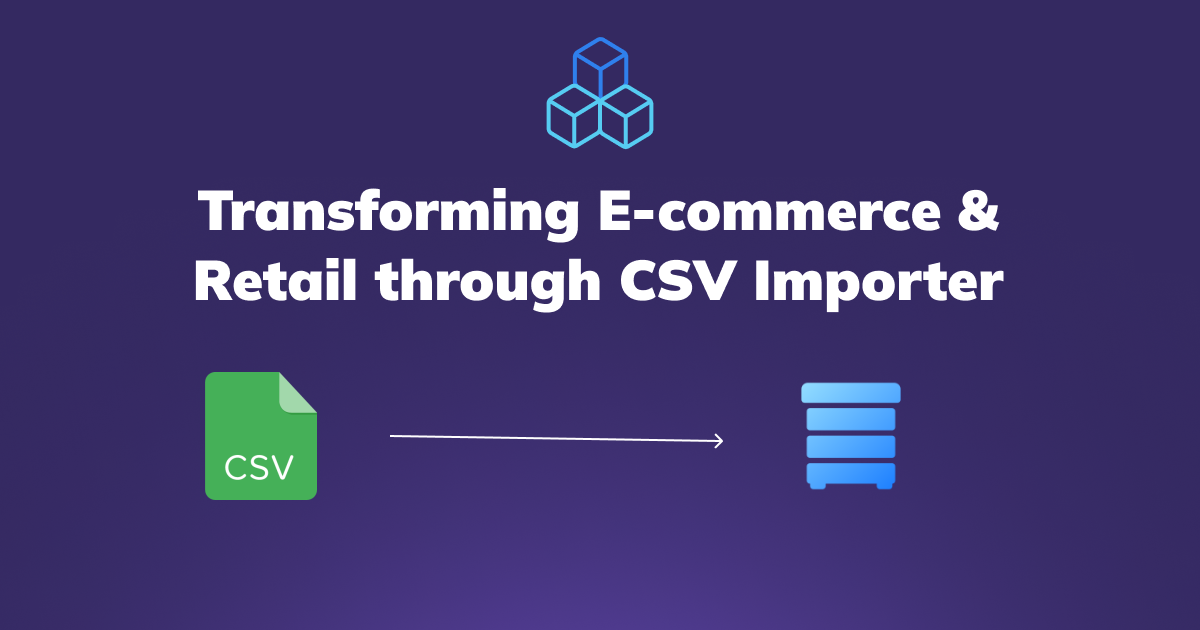Embeddable CSV Data Importer: Transforming E-commerce & Retail Operations

The retail and e-commerce sectors are increasingly turning toward advanced technological solutions to keep pace with the fast-evolving market dynamics.
One such innovation that has garnered significant attention is the embeddable CSV data importer. CSV, or Comma-Separated Values files, are a popular format for storing and exchanging data. Embeddable CSV data importers allow businesses to seamlessly integrate CSV file data into their existing systems and processes, thereby optimizing operations and boosting efficiency.
In this blog post, we explore the multifaceted applications of embeddable CSV data importers in e-commerce and retail, and how they help businesses gain a competitive edge.
1. Streamlining Inventory Management
Effective inventory management is pivotal in both e-commerce and brick-and-mortar retail. An embeddable CSV data importer simplifies this process significantly.
- Accurately Track Stock Levels: With CSV importers, businesses can easily upload inventory lists to their management systems. This ensures accurate tracking of stock levels, thereby preventing issues like overstocking or stockouts. By regularly updating inventory data via CSV files, businesses can maintain real-time visibility into their stock levels and better manage their supply chain.
- Automating Inventory Replenishment: Embeddable CSV data importers can integrate with inventory management software to automate the replenishment process. For example, when stock levels fall below a predefined threshold, the system can automatically generate purchase orders for suppliers, thereby ensuring that inventory is always at optimal levels.
- Centralizing Inventory Data from Multiple Channels: Retail businesses often sell through multiple channels, both online and offline. An embeddable CSV importer can aggregate inventory data from various sources into a single system, providing a centralized view of stock levels. This helps in managing and updating product availability across all sales channels efficiently.
2. Enhancing Product Data Management
Managing product data is another area where embeddable CSV data importers offer substantial benefits.
- Simplifying Product Updates: CSV importers enable businesses to easily update product information, such as prices, descriptions, tags, and images, in bulk. Instead of manually updating product details one at a time, retailers can make changes in the CSV file and import it into their system, thereby saving time and minimizing errors.
- Maintaining Consistency Across Platforms: Consistency in product data is crucial for a seamless customer experience. With an embeddable CSV data importer, businesses can ensure that all product details are uniformly updated across different sales platforms, including websites, marketplaces, and social media stores. This helps in maintaining brand consistency and avoids any discrepancies that might confuse customers.
- Onboarding New Products Quickly: Launching new products can be time-sensitive. CSV data importers streamline the process of adding new products to the catalog by allowing businesses to upload all relevant product details in one go. This accelerates the product launch process and enables businesses to get new products to market quickly.
3. Optimizing Sales and Customer Data Processing
Efficient sales and customer data processing is integral to a business's success. Embeddable CSV data importers play a crucial role in this aspect.
- Importing Sales Data: Businesses can use CSV importers to upload sales data into their CRM or ERP systems. This includes transaction details, customer information, and sales performance metrics. By analyzing this data, businesses can gain valuable insights into sales trends, customer behaviour, and product performance.
- Segmenting Customer Data: Customer segmentation is vital for targeted marketing and personalized customer experiences. CSV importers enable businesses to easily segment their customer data based on various criteria, such as purchase history, geographic location, and customer preferences. This segmentation helps in tailoring marketing campaigns to different customer groups, thereby enhancing customer engagement and driving sales.
- Enhancing Customer Support: Effective customer support depends on having access to accurate and up-to-date customer information. By importing customer data through CSV files, businesses can ensure that their customer support teams have all the necessary information at their fingertips. This enables them to resolve customer queries and issues more efficiently.
4. Data Migration and Integration
Embeddable CSV data importers facilitate seamless data migration and integration processes.
- Migrating Data from Legacy Systems: Many retail and e-commerce businesses still rely on legacy systems for various operations. When transitioning to more advanced systems, data migration can be a daunting task. CSV importers simplify this process by allowing businesses to export data from legacy systems into CSV files and then import it into the new system, ensuring a smooth transition.
- Integrating with Third-Party Applications: Retail businesses often use multiple third-party applications for functions like payment processing, logistics, and marketing automation. Embeddable CSV data importers enable seamless integration of data between these applications and the business’s core systems. This ensures that data flows smoothly across all systems, enhancing overall operational efficiency.
- Facilitating API Integrations: For businesses that rely on API-based integrations, CSV importers can serve as an intermediary tool. By converting data into CSV files, businesses can easily pass it through various APIs, ensuring compatibility and facilitating smooth data exchange between different systems.
5. Improving Data Quality and Accuracy
Maintaining high data quality is crucial for making informed business decisions. Embeddable CSV data importers contribute to improving data quality and accuracy in several ways.
- Data Validation: Most embeddable CSV importers come with built-in data validation features that check for errors and inconsistencies before importing data into the system. This ensures that only accurate and clean data is integrated, reducing the likelihood of errors and discrepancies.
- Standardizing Data Formats: CSV importers allow businesses to standardize their data formats, ensuring consistency across all imported data. This standardization is vital for accurate data analysis and reporting, as well as for maintaining data integrity across different systems.
- Reducing Manual Data Entry: Manual data entry is prone to errors and can be incredibly time-consuming. By using CSV importers to automate data import processes, businesses can minimize the need for manual data entry, thereby reducing errors and freeing up valuable resources for more strategic tasks.
6. Enhancing Analytics and Reporting
Accurate and timely data is the backbone of insightful analytics and reporting. Embeddable CSV data importers play a significant role in enhancing these aspects.
- Aggregating Data from Multiple Sources: Businesses often collect data from various sources, including online sales, in-store transactions, and customer interactions. CSV importers facilitate the aggregation of this data into a single system, thereby providing a comprehensive view of business performance. This aggregated data can be used for in-depth analytics and generating insightful reports.
- Facilitating Real-Time Reporting: In today’s fast-paced retail environment, timely information is crucial for making informed decisions. CSV importers enable businesses to regularly update their data, ensuring that reports and analytics are based on the most recent information. This helps in making proactive decisions and staying ahead of the competition.
- Enhancing Data Visualization: By importing data into analytics and business intelligence (BI) tools, businesses can create visually compelling and easy-to-understand reports. CSV importers ensure that the data fed into these tools is accurate and up-to-date, enhancing the overall effectiveness of data visualization efforts.
7. Supporting Compliance and Regulatory Requirements
Compliance with industry regulations and standards is crucial for retail and e-commerce businesses. Embeddable CSV data importers can facilitate compliance in several ways.
- Recording Transaction Data: Many regulations require businesses to maintain detailed records of all transactions. CSV importers enable businesses to easily collect and store transaction data in a format that is easy to retrieve and review.
- Ensuring Data Security: Modern CSV importers come with robust security features to ensure that the data being imported and exported is protected from unauthorized access and breaches. This is crucial for maintaining compliance with data protection regulations like GDPR and CCPA.
- Facilitating Audits: In the event of an audit, businesses need to provide detailed records and reports. CSV importers make it easy to compile and present the required data in a clear and organized manner, ensuring that the audit process goes smoothly.
8. Enhancing Marketing and Promotional Activities
Effective marketing is key to driving sales and brand growth. Embeddable CSV data importers enhance marketing efforts in various ways.
- Managing Email Campaigns: CSV importers can be used to upload and segment email lists, ensuring that email campaigns are targeted and effective. Businesses can import customer data into their email marketing platforms, allowing for personalized and segmented email outreach.
- Tracking Marketing Performance: CSV importers can also be used to import data on marketing performance metrics, such as click-through rates, conversion rates, and customer engagement levels. This data can be analyzed to assess the effectiveness of marketing campaigns and make data-driven adjustments.
- Personalizing Marketing Content: By importing customer data, businesses can create more personalized marketing content. For example, they can tailor product recommendations and promotional offers based on a customer’s past purchase history and preferences, thereby enhancing customer satisfaction and loyalty.
Conclusion
In the competitive world of e-commerce and retail, businesses need to leverage every tool at their disposal to streamline operations, enhance customer experiences, and drive growth. Embeddable CSV data importers offer a versatile and powerful solution for managing various data-related tasks.
From streamlining inventory management and enhancing product data management to optimizing sales and customer data processing, embeddable CSV importers provide a wide range of benefits. By integrating this technology into their operations, businesses can ensure data accuracy, enhance decision-making, and gain a competitive edge in the market.
So, whether you are a small online retailer or a large brick-and-mortar chain, incorporating embeddable CSV data importers into your operations can transform the way you manage and utilize data, ultimately driving your business toward greater success.

